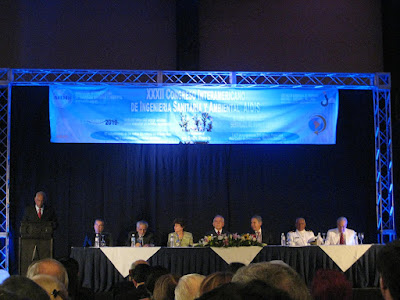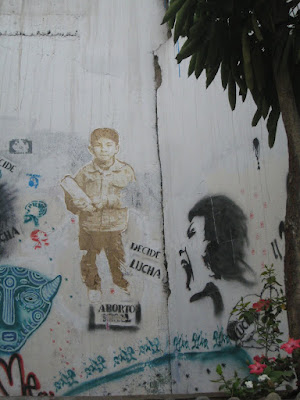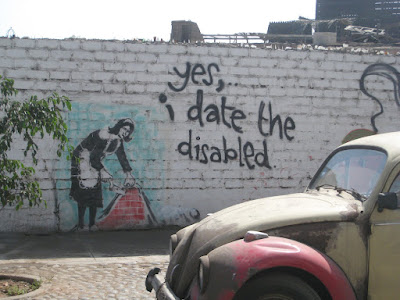Here we are in Santiago!

Chile is a fantastic and sunny place filled with wine and beaches. It was a little shocking to get there and realize just how much more developed it is than Bolivia, and what that means in terms of elegant promenades of palm trees and vegetarian food. It was awesome. What that says about my radical values and all that... well. It's vacation.

We started in Santiago, which was a warm and jolly giant city. I didn't love it, per say, but it beats most of the other Latin American Capitals for charm, anyhow. We went to Neruda's house and looked at the graffiti, wandered around, and watched Sci Fi movies in our hotel. Good times.

We spent Christmas in Valparaiso, which was gorgeous. We walked up and down the huge hills and looked at the pretty murals a lot, and I got to feel magically super human, as my body had apparently adjusted to the altitude in Bolivia at last, and I could pretty much take the hills at a run without loosing my breath at all. Cheating, I suppose, but glorious. We spent Christmas on the beach where dad amused me and a large crowd of Chileans by getting into this large plastic ball suspended in water and trying valiantly to move around or even stand up in it. We also went to some more deserted beaches that looked a lot like Northern California and Dad found a small lizard, which made his trip.

We followed the glorious sunny milling around with a rather hard core trip Kayaking in the fjords of Northern Patagonia. We landed in Puerto Montt-Varas, and headed south to the tiny town of Hornopirim, the ¨oven of snow¨. It was certainly freezing and wet, and surrounded by snowy volcanoes and huge glacial rivers. Very beautiful. Very very cold. Some of us were not quite prepared for this change in climate. We stayed on the edge of the witches´ mountains. We were close to Chiloe, which is famous for it's folk tales. We went South from there, along part of the Austral road (which sounds somehow both romantic and tough to me) and kayaked in and out of these huge, wild, empty fjords.

I don't believe I ever really thought too hard about what a fjord actually is, beyond a crinkly thing that Slartibartfast made and something massive that lives in Norway. These were very beautiful immense hills covered in a strange and rare southern rain forest and hundreds of cold waterfalls. At the end of each fjord is a mountain covered with a huge glacier, which is what forms the waterway. We saw dolphins, sea lions, seals, a lone lost penguin, and exactly 3 other humans, whom dad mistook for birds at first. There were a lot of hidden hot springs for warming up in, some utilized by Germans hiding out in their warship in WWII. Every peak looked like it might have a whole Indiana Jones type hidden city in it, still lost to man. And no one has ever climbed many of these peaks, so you never know, though the indigenous folk Chile is famous for are all from further South, where they went around in the cold naked and painted in stripes until some Europeans came and took them off to a
zoo in Paris. Yeah.
Our last day paddling we had to do 15 miles before afternoon, which nearly wiped my dad and I out completely. Some of us may have shed a small tear. That day it was sunny and warmer at least. New Year's Eve was promptly slept though. Then it was back to 90 degree plus Santiago, and a trip to Isla Negra to see Neruda's beach house. He loved the sea but was afraid to sail, and built all his homes to resemble, quite impressively, boats. He also collected immense amounts of strange things. We approved. Dad ended up spending two days in the Santiago airport while I made my way back by bus from Arica, in the North of Chile. I was treated to a surprise route through an apparently famous national park in the desert, filled with volcanoes and alpacas. It was gorgeous and made up for the last five hours of buses in Bolivia, which I spent in a luggage hold under the bus due to a shortage of seats. (It's ok family friends, it wasn´t so totally bad, ok? I had granola bars, my sleeping bag, my ipod, and a traveling companion. It was just like camping out! Or train hoping!)

Now I'm home! Which is strange, but really great, actually. I'm excited to get back to work, back to life. No one here was pleased that I went to Chile- Bolivia is still upset that they stole their ocean 150 years ago, and they refuse to fly directly into Chile or even have ambassadors there. They also make fun of their accent, which is weird but actually pretty fun. I learned the slang for money, dude, girlfriend, and lame, which is pretty decent, I think. Anyhow! Onwards. Check out Bolivia's newest radical plans
here, and you still have till the 15th to give money to my project in Santa Barbara if you feel like it. Also did you know that Google can be used in Quechua? Kosa pacha! Besos!
m
















































